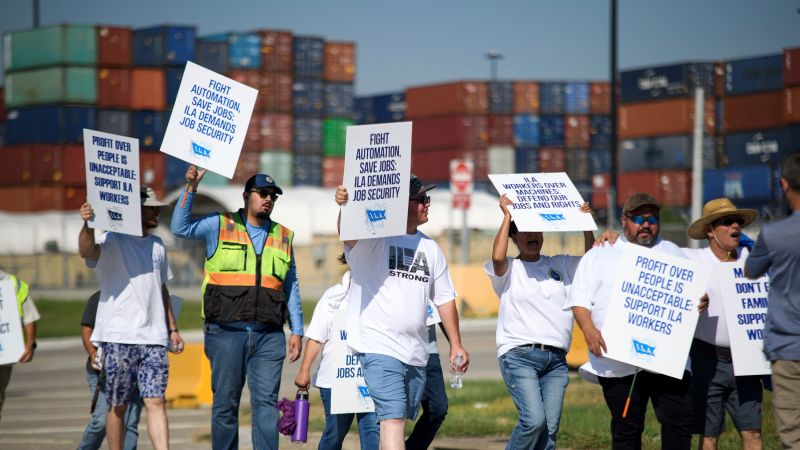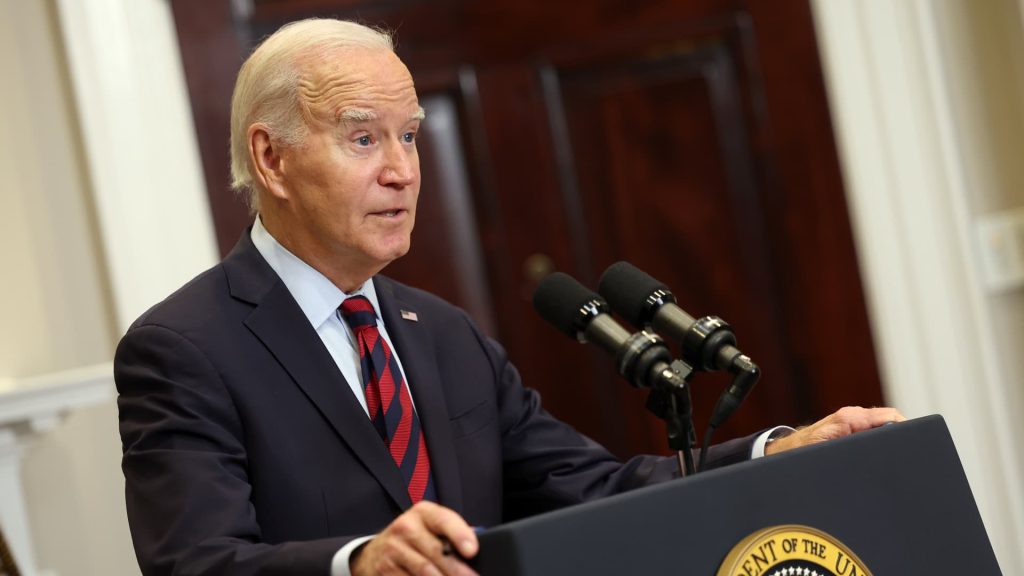Striking members of the International Longshoremen’s Association will be back to work at the ports on Friday, the union announced Thursday evening, as the union and the management group representing shipping lines, terminal operators and port authorities have reached a tentative deal on wages.
The agreement on wages amounts to a $4-per-hour raise for each year of the six-year contract, a source with knowledge of the negotiations told CNN. That amounts to a first year raise of just over 10% of the current contract’s top pay of $39 an hour. With the five subsequent pay hikes it would raise wages by 62% over the life of the contract
The union agreed to extend the contract it had with the United States Maritime Alliance, the management group known as USMX, which represents shipping lines, terminal operators and port authorities. That deal, which had expired at the end of Monday, will be now extended until January 15 and have the union members back on the job while the final details are worked out in a full agreement and it is ratified by the rank-and-file.
In a statement, President Joe Biden praised the tentative wage deal.
“Today’s tentative agreement on a record wage and an extension of the collective bargaining process represents critical progress towards a strong contract,” he said in the statement. “I congratulate the dockworkers from the ILA, who deserve a strong contract after sacrificing so much to keep our ports open during the pandemic. And I applaud the port operators and carriers who are members of the US Maritime Alliance for working hard and putting a strong offer on the table.”
Acting Secretary of Labor Julie Su was onsite in North Bergen, New Jersey, meeting with both parties as the talks entered their final stages, according to a source familiar with the matter.
Su helped broker a deal between West Coast port workers represented by the International Longshore & Warehouse Union and the Pacific Maritime Association in 2023, which resulted in a 32% pay increase over the life of the five-year contract.
The 50,000 members of the union working at ports from Maine to Texas have been on strike since early Tuesday morning, halting the flow of the majority of containerized imports into the United States, along with many of the exports, disrupting the sales of American businesses overseas.
A tentative deal would still need to be ratified by the rank-and-file ILA members before it would take effect. But with ships stuck at sea unable to come into US ports to unload and load goods, the union has agreed to have workers return to work on Friday.
Still, should the members vote against the deal, the strike might start once again. And such a rejection of a tentative labor deal is not unheard of.
Just last month, the International Association of Machinists (IAM) and jet maker Boeing reached a tentative deal that union leaders recommended their 33,000 members accept and even described as the best deal they had ever negotiated with the company. But union members voted nearly unanimously to reject it and have remained on strike since September 13.
The port strike was still in its early days, but it would have had broad ramifications for the US economy the longer it continued.
Business groups have been calling on the Biden administration to order strikers back to work. The work stoppage threatened the supply of everything from bananas to liquor to European luxury cars, all with the busy holiday shopping season less than two months away. And those shortages could have resulted in upward pressure on prices.
But President Joe Biden had refused to use powers he has under the Taft-Hartley Act to block or end the strike, saying he would not interfere with the collective bargaining process. Biden, Vice President Kamala Harris and Secretary of Transportation Pete Buttigieg had all called on the USMX to negotiate a deal with the ILA that fairly shared the record profits with members.
Shipping rates soared during and immediately after the pandemic, as supply chains snarled and demand surged. According to analyst John McCown, industry profits from 2020-2023 topped $400 billion, which is believed to be more than the industry had previously made in total since containerization started in 1957.
The USMX said on Monday that it had offered workers a nearly 50% raise over the six-year life of the contract, which comes to an average raise of $3 an hour per year on top of the current top hourly base wage of $39. The union had been demanding $5 an hour per year, according to ILA President Harold Daggett. That would have raised hourly pay by about 77% over the life of the deal.
Daggett said soon after the strike started on Tuesday morning that the union had been willing to consider a recommendation from the Biden administration that both sides agree to a $4-an-hour wage increase but that when USMX had proposed the $3 raise, the union had moved back to its $5 an hour demand.
This story has been updated with additional context and developments.
Read the full article here







